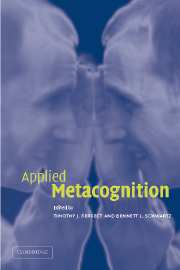Book contents
- Frontmatter
- Contents
- List of contributors
- Preface
- 1 Introduction: toward an applied metacognition
- Part 1 Metacognition in learning and education
- 2 The relation between metacognitive monitoring and control
- 3 Metacognition for text: findings and implications for education
- 4 Influence of practice tests on the accuracy of predicting memory performance for paired associates, sentences, and text material
- Part 2 Metacognition in everyday memory
- Part 3 Metacognition in different populations
- References
4 - Influence of practice tests on the accuracy of predicting memory performance for paired associates, sentences, and text material
Published online by Cambridge University Press: 22 September 2009
- Frontmatter
- Contents
- List of contributors
- Preface
- 1 Introduction: toward an applied metacognition
- Part 1 Metacognition in learning and education
- 2 The relation between metacognitive monitoring and control
- 3 Metacognition for text: findings and implications for education
- 4 Influence of practice tests on the accuracy of predicting memory performance for paired associates, sentences, and text material
- Part 2 Metacognition in everyday memory
- Part 3 Metacognition in different populations
- References
Summary
Learning and retaining class material is not only the primary goal in many class exercises (e.g. from learning the ABC to the periodic table of the elements) but may be essential for successfully mastering more complex lessons (e.g. reading, and developing chemical compounds). Accordingly, many researchers and educators have devoted their careers to engineering techniques that will improve learning. In the present chapter, we discuss the utility of one technique for improving individuals' ability to master new materials: practice tests or self-testing. A practice test involves an individual testing their memory or comprehension of class material to evaluate whether they will succeed on a subsequent test and, as such, can be considered a metacognitive activity. That is, practice testing may inform the learner about the degree to which to-be-learned materials have been stored in memory (or have been comprehended) so that they can accurately predict future test performance. In this way, practice tests may help students to regulate their study more effectively. For instance, a student may devise a test to evaluate whether to-be-learned material can be retrieved. If the material is retrieved during the test, they can move on to study other less well-learned materials. If the material is not successfully retrieved, then more study time should be allocated. The idea is that self-testing will improve the efficiency of self-regulated learning by helping students isolate poorly learned material for restudy. This simple strategy has been included in popular learning techniques and is undoubtedly used by many students.
- Type
- Chapter
- Information
- Applied Metacognition , pp. 68 - 92Publisher: Cambridge University PressPrint publication year: 2002
References
- 21
- Cited by



